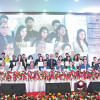Our love-hate relationship with university rankings

We love university rankings, especially when our names grace the list. Without this recognition, we'd easily find 10 reasons to criticise the process. The prestigious QS World University Rankings (WUR) 2025 naming Dhaka University as the most improved university in the country makes us revisit our love-hate stance.
Recently, Dhaka University, over 100 years old, achieved its best-ever position in the QS world rankings, landing in the 554th position among 1,500 shortlisted universities. To be eligible for QS WUR, an institution needs at least 100 papers indexed by Scopus and published over five years. This predominantly anglophone ranking landscape overlooks non-English and non-indexed journals, often favouring science or quantitative subjects over humanities and social sciences.
As Bangladesh's first fully fledged university, DU has significantly contributed to forming a middle class and laying the foundation for civil bureaucracy and political leadership. Ranking agencies will not test DU for its prestige and exclusivity. It will rather use a distinct methodology that often disregards the university's heritage, legacy, and social impact. To be ranked among the best global universities, we must meet a different set of data-driven expectations. It is a different ball game.
For example, the Academic Ranking of World Universities (ARWU) prioritises universities with Nobel laureates, field medallists, highly cited researchers, or papers in nature or science, resembling the fabled stork inviting tigers to eat from narrow jars. This elitist system can perpetuate societal inequities, countering higher education's goal of eradicating inequalities for a just world. This idea of sustainability has been included in QS WUR as well as Times Higher Education Impact Rankings.
For evaluation, QS uses specific criteria and weighted factors. The table below shows a comparative performance analysis of the three Bangladeshi universities in the top 1000 list.

This year, DU and Bangladesh University of Engineering and Technology (BUET) have moved up from their previous bands of 691-700 and 801-850, respectively, while North South University (NSU) has slipped from its previous year's 851-900 rank. The improvement in top universities' performances suggests strategic interventions by our premier institutions.
Previously, many public officials and university leaders have publicly criticised rankings, arguing that data-driven quality measurement is flawed. Can we quantify quality, particularly in light of rumours that many ranking actors manipulate data to achieve high scores? A huge scandal erupted in 2021 when Columbia University faced accusations of data fabrication. Many universities do this because ranking is one way to attract better students. To join the elite group of top academic institutions, one requires substantial subscription fees, visibility efforts, and costs for international collaboration. Competing with resource-heavy institutions is challenging for a state-funded university like DU that charges minimal tuition.
QS WUR's unique data collection emphasises internationalisation (45 percent). Achieving global academic perceptions requires higher budgets, which many faculty members lack. Going to international conferences and forums are expensive affairs. Then, there are the heavy processing fees for research publications in indexed journals, sometimes up to $5,000 per paper. Meeting QS's criteria necessitates a minimum of 100 such publications annually. Our academic perceptions depend a lot on what we present and write on international platforms.
Both DU and BUET perform relatively well in terms of employability and employer perceptions. NSU, being newer, has progress to make in terms of employer outcomes. BUET's employer reputation score is concerning, showing a disconnect between students' studies and their eventual employment. For example, a customs or police officer with a mechanical engineering degree is unlikely to impress the rankers evaluating employer outcomes.
DU's international research network benefits from nearly 500 MoUs worldwide, but it faces challenges in enhancing student and faculty mobility. Three ministries currently vet international student applications before consideration. The bureaucratic red tape is one of the main deterrents for foreign students. To create a mobility window, our curricula need an international outlook, facilitating credit transfers and dual degrees. This cannot be done without government-level interventions. We need to view international students as a potential revenue source and come up with a comprehensive branding strategy like those in Malaysia and India. Even in the 1980s, Bangladesh was a destination for higher education. We need to regain that status by updating our facilities like dormitories and social security. The inclusion of sustainability as a ranking category is another case in point. Our infrastructure, policies, curricula, and extracurricular activities must demonstrate our commitment to sustainability and inclusivity to perform better in this category.
As the director of DU's international affairs office, I know how difficult it is to attract international students and faculty. Some MoUs have allowed us to host about 15 foreign faculty members, largely thanks to our partners' contributions. This earned DU a score of 1.6 out of 5. BUET scored zero, while NSU, with generous incentives for foreign faculty and dual nationals, outperformed its local rivals with a score of 7.9. BUET's international research network is far from satisfactory. Given the number of brain-drained NRB scholars that BUET has, one hopes to see better results in the future.
Academic reputation, crucial in rankings, has become a PR and networking activity, requiring our scholars to participate in international forums and conferences. Limited budgets often prevent faculty from travelling abroad or paying conference fees. Researchers face hefty processing fees for publication in indexed journals, which is necessary for QS consideration. If the government is sincere about university ranking, it must allocate dedicated research funds with specified desired outcomes.
In the age of globalisation, we cannot ignore the pull of ranking. We need to incentivise the local institutions so that they can improve their global footprints. Then again, we should not bifurcate the higher education system by promoting a segment of elite institutions. Real changes will come once we find the right balance between our primary, secondary, and tertiary systems. An improved higher education system will have a trickle-down effect on the other two. The sooner the stakeholders realise the importance of shaping our higher education system in alignment with the global system, the better it is for all of us.
Dr Shamsad Mortuza is a professor of English at Dhaka University.
Views expressed in this article are the author's own.
Follow The Daily Star Opinion on Facebook for the latest opinions, commentaries and analyses by experts and professionals. To contribute your article or letter to The Daily Star Opinion, see our guidelines for submission.

 For all latest news, follow The Daily Star's Google News channel.
For all latest news, follow The Daily Star's Google News channel. 










Comments